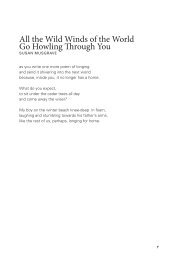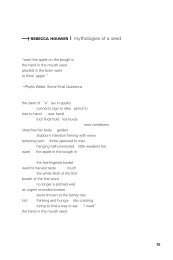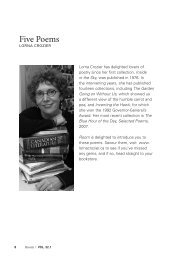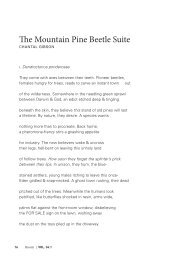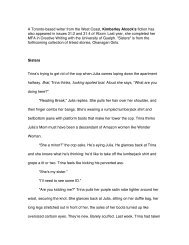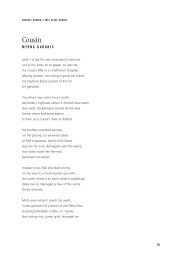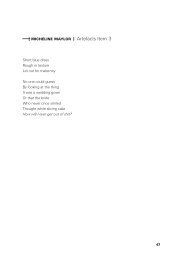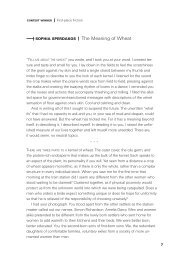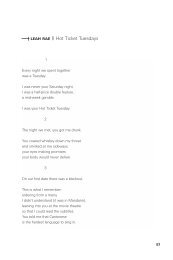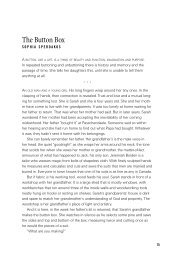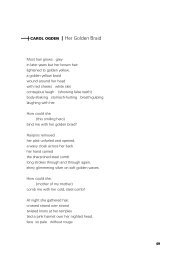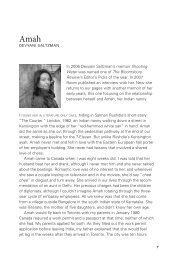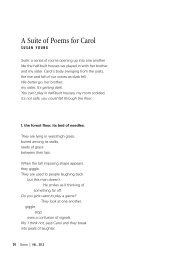On Losing Their Father by Sue Goyette - Room Magazine
On Losing Their Father by Sue Goyette - Room Magazine
On Losing Their Father by Sue Goyette - Room Magazine
You also want an ePaper? Increase the reach of your titles
YUMPU automatically turns print PDFs into web optimized ePapers that Google loves.
<strong>On</strong> <strong>Losing</strong> <strong>Their</strong> <strong>Father</strong><br />
SUE GOYETTE<br />
Eventually our grief, in the guise of a funeral home,<br />
settled and we were offered the exhausted upholstery<br />
of ritual. When we couldn’t speak, we sat. The dreaded<br />
silence was navigated <strong>by</strong> polished shoes and Kleenex boxes<br />
reincarnated as kindling for the fire. Later, we will burn.<br />
But for now we watched the framed print of Flowers<br />
in a Vase narrate this wilderness. We knew, for example,<br />
that our stems had been cut on an angle. That we’d been placed,<br />
artfully, in a glass vase that reflects or rather infers the rest<br />
of the room. <strong>On</strong>e of us had dropped a petal and the rest of us<br />
were flowering as hard as we could. Anyone with any heart at all<br />
will feel for these chairs and the work they’ve got ahead of them.
The parking lot was the first indication. There was a series<br />
of flower boxes in the insistent bloom of winter: the tulips of coffee cups,<br />
blue bells of cigarette butts. What were we to make of any<br />
of this? The taxi driver adjusted his small talk and what started off<br />
as leashable and wagging ended up coming out of the woods quickly,<br />
furtively for a drink in his rear-view mirror. He gulped in the red eyes<br />
of our watches and their slow tick of too soon. He barely could take<br />
our money. We barely could give it to him. It felt like he had come<br />
to a full-stop<br />
at every tree, that he yielded to the Atlantic and signaled<br />
before turning<br />
to the inevitable. We pressed our hands into his hands<br />
and waited<br />
as if there was luggage to retrieve and a ferry to catch.<br />
The laundromat<br />
across the street was open. We watched a woman<br />
balance an impossible<br />
load and turned before she dropped anything.<br />
There was only so much,<br />
at this point, we could give.
My children were like alders in the way they bolted<br />
to tree. People stood at the roots of them and looked<br />
up. They lined the hall to be in their shade. No one made room<br />
for the small animals that had tangled their hair to scrabble<br />
now, panicked <strong>by</strong> the walls. The carpets had been sprayed to resist<br />
any kind of forest and here they were in full-leaf. Some people<br />
wanted to touch them as if they were monks steeped in loss<br />
and had tea to offer brewed from stories of broken bowls<br />
and mountains to soothe them all. Some of them plucked their names<br />
and carried them off to add to their evening meal of what they did<br />
and who they saw. My daughter teetered first.<br />
Later. When she was alone with the river that had been<br />
her father. It was like she didn’t mean it to happen,<br />
that all she had wanted was to lean over<br />
and drink.
I want to say that a tree fell, the way a tree falls and offers itself<br />
across the water and when we encounter it, we don’t see the fallen tree<br />
but a way to get across. But she didn’t fall across the water. She fell into<br />
her father and I stood for many, many months at his shore and waited<br />
for her. When evening came, I gathered wood and lit a fire.<br />
I read the cursive line of ants and studied the emerald of bird song.<br />
I ate mushrooms for the stews they’d make and drew maps<br />
of the sky on the hind leg of moonlight. I picked river rushes and sewed<br />
a small boat that could only carry the weight of my voice. In it, I packed<br />
all of her<br />
names. Her secret names, her bedtime names. I stood<br />
at the back door<br />
of her childhood and called to her with supper<br />
in my lungs. I bellowed<br />
her bath time and urged her to run<br />
towards the net with the ball,<br />
to give it a good and final kick. I sat up<br />
with her and spelled the difficult words<br />
of farewell.<br />
Finally, I addressed her as woman. I combed the long hair<br />
of her absence and sent fish scurrying with my feet.
She returned as a stranger and begged for a meal. I cut an onion<br />
and heated the oil. When I offered her a plate, she had lost her appetite.<br />
Often, she’d turn her head as if someone was approaching from a great<br />
distance. She’d complain of the cold and then of the heat. Her treasure<br />
was a small jar filled with her father’s voice. She’d wake in the morning<br />
with seaweed in her hair and a vague memory of low tide.<br />
The distance between them was oceanic, she explained, which was why<br />
she spent so much time at sea. She made films of herself wading<br />
into the ocean<br />
and studied the angle of her heart to her arms.<br />
She choreographed her entry<br />
into water to correspond with moonlight<br />
and the fine prow of memory.<br />
When she heard a girl call for her father,<br />
she rescued the word<br />
as if it had flown into a window. To see her crouch<br />
and pick it up,<br />
soothe its eyes of terror and coax it back to flight.<br />
<strong>On</strong>ce I saw her<br />
open her treasured jar and quickly dab a paint brush<br />
into his voice.<br />
All her portraits, when she was a girl, had their hands<br />
behind their backs.<br />
She was no good at hands, she had explained,<br />
so she hid them.
I decided to follow her. Her hair has always been a lantern<br />
and she cast an easy light. There is mining in my blood<br />
which is why she chose me. I marked my trail with thorns<br />
and seldom flowered. I stood far enough away that I couldn’t hear her<br />
but saw the tender poise of her loss as she pleaded with an ocean<br />
so sullen the waves broke silent. There is blood in my mining<br />
which is why she chose me and so I rolled up the night and beat it<br />
free of dark. I stood until I felt myself being tasted <strong>by</strong> the trees.<br />
Eventually, they consumed me and in this way I could talk to him.<br />
There was a marsh around our marriage that I sunk up to my knees in.<br />
But none of him mattered and I had been consumed. My voice,<br />
when I pulled it<br />
from the ground, sputtered the way root vegetables<br />
held to the light sputter,<br />
freeing themselves finally of dirt. Listen, I said.<br />
When I could.
My leaves are uncertain and so I speak the truth. This is the ceremony<br />
beginning. It isn’t my voice that has his attention but my breath:<br />
the little sparrow that flits past my heart and smells of home.<br />
He is so young on this shore and has taken apart the only compass<br />
he owned. His name is a flock fishing the shallow water, the wind<br />
pushing it apart; the water, holding it under for too long.<br />
He is surprised to see me. Surprised that I allow myself to be split<br />
into boat. This is the work of marriage long after it has ended.<br />
The paddle I push him off with is the vow I had once made.
A woman moves against the tide at the funeral home<br />
while we’re being offered strawberries and tea. She approaches us<br />
as if we are without rock, our shore, sandy. Her name is Susan.<br />
She speaks as if we are planetary, giving off such a light<br />
that she is bathed in its blessing. She looks at my children<br />
as if they are children. I found your father, she tells them. I was the one<br />
who found him. Suddenly, they do not know what to do with strawberries.<br />
Suddenly strawberries are something to be cared for, tended.<br />
Nurtured. Should they sit down with the strawberries, they wonder.<br />
Should they make a small bed for these berries and turn off the lights.<br />
They are such small children to be making these decisions.<br />
They are such small<br />
children that when she breathes the breath<br />
she has been holding for them,<br />
they feel him with such force,<br />
they are blown close to sinking.



